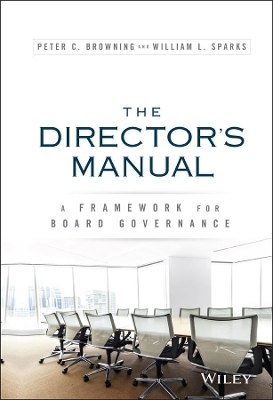
The Director's Manual
John Wiley & Sons Inc (Verlag)
978-1-119-13336-0 (ISBN)
Directors: Improve Board Performance The Director's Manual: A Framework for Board Governance offers current and aspiring board members essential up-to-date governance guidance that blends rigorous research-based information with the wisdom found only through practical, direct experience. The book's flexible approach to solving governance issues reflects the authors' belief that no two boards and the cultural dynamics that drive them are the same. As such, the advice offered reflects recognizable leadership dynamics and real world, relevant organizational situations.
The book's two authors, Peter C. Browning, an experienced CEO and member of numerous boards and William L. Sparks, a respected organizational researcher, combine their individual experiences and talents to create a book that is both innovative and applicable to directors in any industry sector. Specific best practice guidance is designed to help board members and their directors understand the unique strengths and challenges of their own board while at the same time provide targeted information that drives needed improvements in board performance and efficiency. Specifically, this book will help board members:
Explore practical advice on key issues, including selection, meeting schedules, and director succession
Consider board performance from multiple perspectives, including cultural and group dynamics
Discover how to effectively manage classic problems that arise when making decisions as a group
Access a comprehensive set of assessment questions to test and reinforce your knowledge
The Director's Manual: A Framework for Board Governance offers practical advice to guide you as you lead your organization's board.
PETER C. BROWNING, with experience on the boards of 13 public companies, two as CEO, is founder and managing director of Peter Browning Partners, LLC, a board advisory service that helps directors answer tough questions in the areas of board governance, board performance and dynamics, and leadership transition and succession planning. WILLIAM L. SPARKS, PhD, is vice president of Talent with EnPro Industries and a managing partner with Peter Browning Partners, LLC. Concurrently he serves as the Dennis Thompson Chair of Leadership at the McColl School of Business at Queens University of Charlotte.
Acknowledgments ix
Peter C. Browning ix
William L. Sparks x
Preface xi
Why We Wrote This Book xi
Chapter 1 The Changing World of Board Governance: How We Got Here 1
What’s in This Chapter? 1
How and Why Boards Have Changed 2
Why These Events Are Important 3
A Barometer for CEO Compensation 5
2002—A Board Governance Tipping Point 9
Impact of the 2008 Financial Meltdown 14
Chapter Summary 17
What’s Next? 18
Chapter 2 Role of the Board 19
What’s in This Chapter? 19
Home Depot’s Leadership Question 20
Two Key Guiding Principles 22
Why Boards Exist 23
Three Critical Questions That Boards Ask 24
Is the Right CEO Running the Company? 25
Is a Robust Succession Plan in Place? 29
Determining the Right Strategy 30
Chapter Summary 31
What’s Next? 32
Chapter 3 Key Board Leadership Roles 33
What’s in This Chapter? 33
Public Outcry for Action 35
Changes in NYSE Listing Requirements 36
The Debate over the Separation of Roles 37
Nonexecutive Chairman, Lead Director, or Presiding Director 40
The Challenge of Board Leadership 42
Chapter Summary 45
What’s Next? 45
Chapter 4 Board Culture 47
What’s in This Chapter? 47
Understanding Board Culture 48
Examples Illustrating Schein’s Model of Culture and Board Dynamics 50
The Three Elements of Board Culture 51
The Leadership and Board Performance Cycle 58
Transforming Board Culture 63
Chapter Summary 66
What’s Next? 67
Chapter 5 Group Dynamics and Board Decision Making 68
What’s in This Chapter? 68
Why Working in Groups Is Difficult 69
Groupthink: Managing Conflict in the Boardroom 72
Understanding and Avoiding Groupthink 74
Getting Past The Abilene Paradox 76
Chapter Summary 81
What’s Next? 81
Chapter 6 Board Structure and Schedule 82
What’s in This Chapter? 82
Board Size 83
Meeting Requirements and Preparation 84
Effective Meetings and Service 90
Chapter Summary 91
What’s Next? 92
Chapter 7 Assessing Board Performance 93
What’s in This Chapter? 93
The Evolution of Board Assessments 94
Customizing the Assessment Process 96
Finding Your Own Best Practice 98
Chapter Summary 101
What’s Next? 101
Chapter 8 The Challenge of the Disruptive Director 103
What’s in This Chapter? 103
Disruptive Members a Common Issue 104
The Ying and Yang of Conflict 105
An Effective Dissenter 106
Five Types of Disruptive Directors 107
Dealing with Disruptive Directors 109
How Assessments Help 110
Chapter Summary 111
What’s Next? 112
Chapter 9 The Other Succession Challenge: The Board of Directors 113
What’s in This Chapter? 113
Why a Board Needs to Plan for Succession 114
Demographics and Board Service Realities 115
Enron, the 2008 Financial Collapse, and Dodd-Frank 115
Building a Board Succession Plan 117
Educating, Onboarding a New Member 123
Chapter Summary 124
What’s Next? 124
Chapter 10 What’s Next in the Boardroom? 125
What’s in This Chapter? 125
Ongoing Scrutiny of Executive Compensation 127
Continuing Demands for More Proxy Information 129
More Shareholder and Investor Activism 130
Greater Demands for Proxy Access 132
Sharper Focus on Risk Management 133
Ever-Increasing Scrutiny of Board Composition 134
The Way Forward 134
Chapter Summary 135
What’s Next? 136
Appendices Board of Directors Assessment Forms 137
Appendix A Board of Directors Self-Assessment 138
Appendix B Audit Committee Assessment 152
Appendix C Compensation Committee Assessment 154
Appendix D Governance/Nominating Committee Assessment 156
Appendix E CEO Assessment 158
Appendix F Lead Director Assessment 163
Appendix G Nonexecutive Chairman Assessment 165
Appendix H Peer Assessment 167
Notes 169
About the Authors 179
Index 183
| Verlagsort | New York |
|---|---|
| Sprache | englisch |
| Maße | 158 x 231 mm |
| Gewicht | 386 g |
| Themenwelt | Wirtschaft ► Betriebswirtschaft / Management ► Unternehmensführung / Management |
| ISBN-10 | 1-119-13336-X / 111913336X |
| ISBN-13 | 978-1-119-13336-0 / 9781119133360 |
| Zustand | Neuware |
| Haben Sie eine Frage zum Produkt? |
aus dem Bereich


